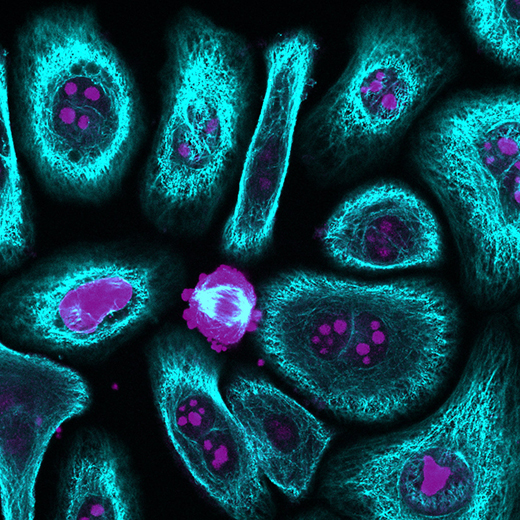Biologist receives national funding for cervical cancer research
Thursday, May 7, 2020

This image of cervical cancer cells was captured with fluorescence microscopy. | Download this photo.
MANHATTAN — More than half a million cervical cancers are diagnosed worldwide each year. Although most of them can be treated effectively with a drug called Cisplatin, some are resistant to it. A Kansas State University biologist is working to understand Cisplatin-resistant cervical cancers.
Nicholas Wallace, assistant professor in the Division of Biology, studies human papillomavirus, or HPV, a common virus that causes almost all cervical cancers. He has received a $454,466 R15 Academic Research Enhancement Award from the National Cancer Institute of the National Institutes of Health for his study, "HPV Oncogenes Dysregulate Translesion Synthesis."
According to Wallace, the tumors that do not respond to Cisplatin are quite deadly. But if Cisplatin resistance were identified early, more effective treatment options could be used. His team is working to discover the unique features of Cisplatin-resistant cancers.
"Our goal is to help doctors identify cervical cancers that would respond better if treated with a different approach," Wallace said. "Sadly, there is currently no established method to distinguish cervical cancers that will respond to Cisplatin from those that will not."
Wallace's team has already identified one way cervical cancers become resistant to Cisplatin. Cancerous cervical cells can change how they respond to damage caused by sunlight, a process called translesion synthesis. The changes protect them against Cisplatin.
The initial studies were supported by the Johnson Cancer Research Center at Kansas State University with a gift from the late Les Clow. The National Cancer Institute award will help them expand on this research.
"We hope our efforts will improve the lives of women fighting cervical cancer around the world," Wallace said.
NIH Academic Research Enhancement Awards support small-scale research projects at educational institutions that provide baccalaureate or advanced degrees for a significant number of the nation's research scientists to support meritorious research, expose students to research and strengthen the research environment of the institution.
The Johnson Cancer Research Center in the College of Arts and Sciences at Kansas State University supports and advances cancer research and education with competitive award programs funded through private donations.
